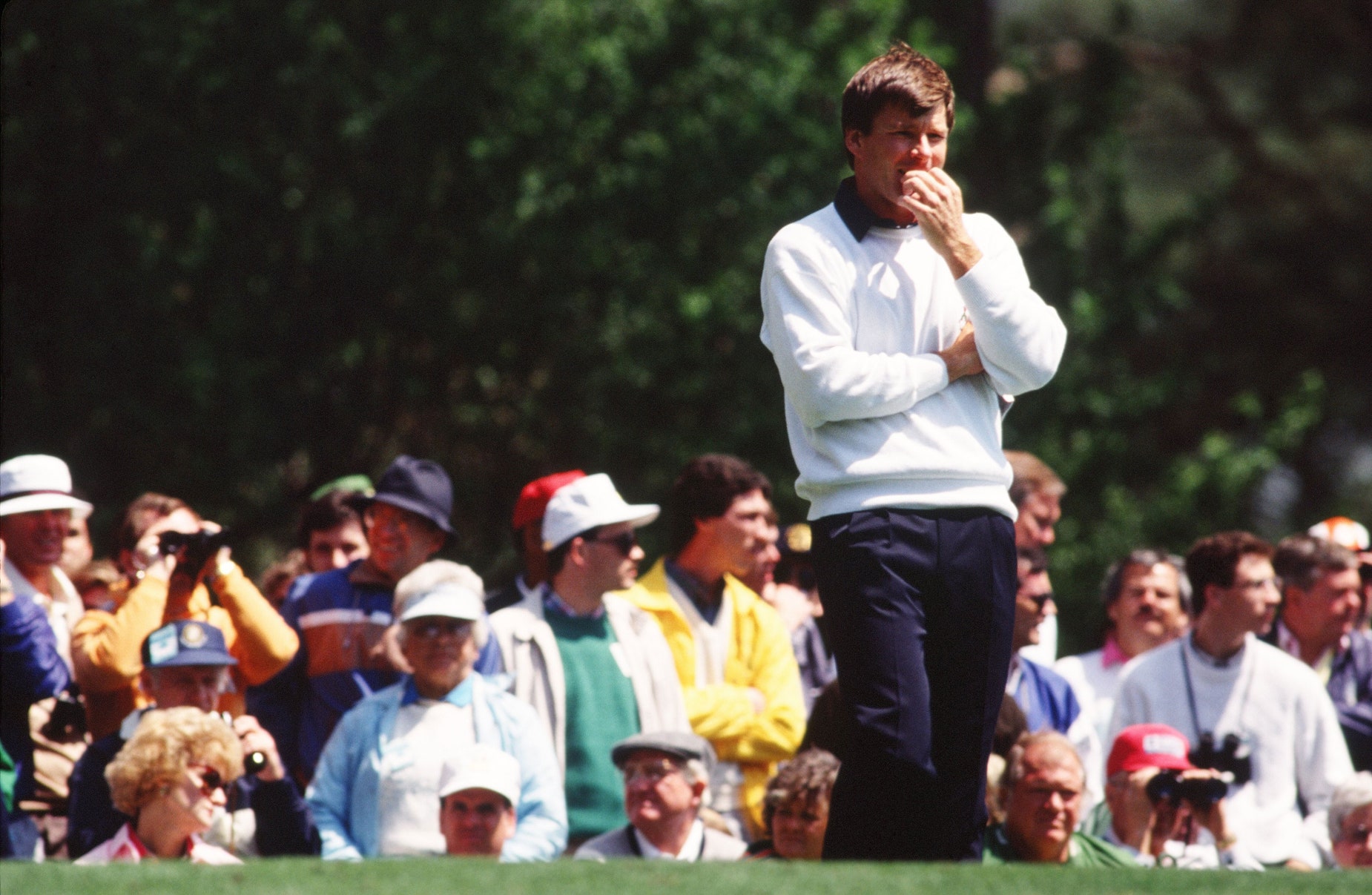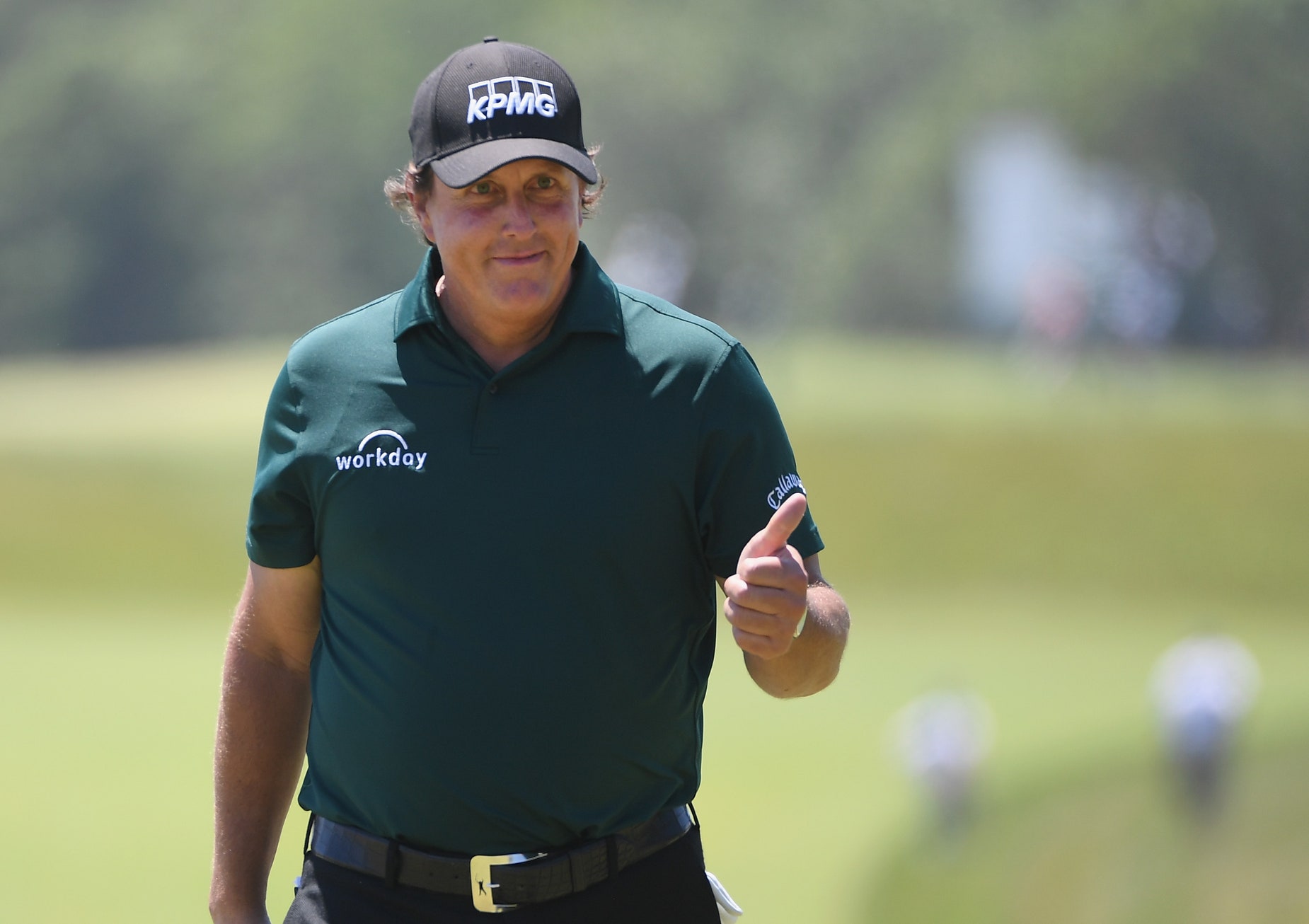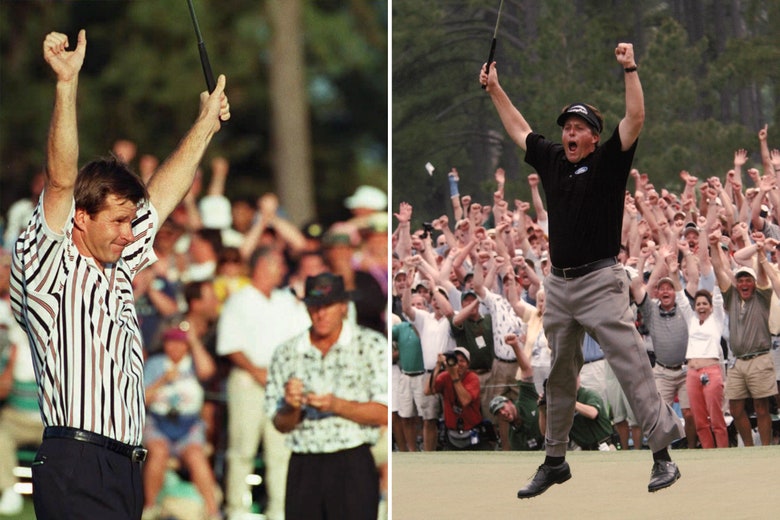By Tod Leonard and Daniel Rapaport
Golf is not so much our profession as it is our passion at Golf Digest, and often that passion translates to philosophical, analytical, ideological and, occasionally, idiotic workplace discussions about the game. During this time of pause in our sport (and in the world at large), we decided to take these office conversations online in hopes of providing a welcome distraction.
In the fourth instalment of the “Great Golf Debates” senior editor Tod Leonard and staff writer Daniel Rapaport tackle the pressing question: Who had the better career, Nick Faldo or Phil Mickelson?
Rapaport: I’ll start with the most crucial number in this debate: Six. It’s the number of majors Sir Nick has in his trophy case. Mickelson, on the other hand, has only five. It might seem like an arbitrary difference of only a major, but take a quick peak at the all-time list and you’ll see that every single player with six or more majors is an absolute icon. No disrespect to John Henry Taylor or James Braid or even Peter Thomson, but the five-major club isn’t doing much for me. Are there inherent problems with judging a player solely by his major tally? Sure. But for better or for worse, it’s the only number that really, truly matters for a player’s legacy. Without looking: How many regular Tour events did Tom Watson win? Or Gary Player? I’ve got more in the Faldo tank, but I believe it’s time for your rebuttal.
Leonard: I knew the six majors was going to be the first salvo. It has to be, because I really don’t think we’re even having this conversation if Faldo and Mickelson are tied with five majors. One of the few (only?) advantages that Faldo owns is that he has one more major win. You make a very good point about the average person not knowing how many Tour wins Tom Watson has, and I would submit that is the case for nearly everybody. Other than Tiger Woods and Sam Snead—who have been in the news a little bit lately—I can’t tell you another icon’s career win total. But, I’ll be honest here, I’ve never had very sharp recall for trivia, and I’d be hard-pressed to tell you off the top of my head how many majors Player or Snead or Byron Nelson won. Jack had 18. Tiger has 15. That’s what I know. I feel like it’s less about the number you won, but HOW and WHEN you won them. And, more importantly, WHO you were competing against. I’ve got some more majors fodder, but it can wait. Curious about your take on strength of field in the eras?
Rapaport: Well, first, a necessary disclaimer: I was born in December 1994. By then, Faldo had won five of his six majors, and I wasn’t yet 2 years old when Faldo won his final major. So I’m probably not the most qualified to comment on the strength of fields in the ’90s. But I will say this—I’m quite wary of the strength-of-field argument, simply because it’s impossible to compare players of different eras. Of course, there’s the equipment element. Phil did basically all his winning after the introduction of the Pro V1, which made players 10 yards longer overnight, and the 460cc driver. It’s simply not apples to apples. Also, by definition, players who were in their primes in the ’90s weren’t in their primes in the 2000s or 2010s, so how can we say the more modern players were better? Because more of them tallied higher win/major totals? Couldn’t that go the other way, as evidence that the guys they were playing against weren’t as good?
But yes, let’s talk about how Faldo and Mickelson compared to the players around them. Faldo was the best player of his generation, the ruler of golf in the 1990s. Norman held the top spot in the world rankings for longer—despite Faldo getting the better of him more often than not—but Faldo was world No. 1 for nearly two years. Mickelson, on the contrary, was never the consensus best player in the world and never ranked No. 1. If we can only judge players by how they fared against their competition, how do you explain the discrepancy there?

Augusta National/Getty Images
Leonard: Man, you were born exactly three years before my son, so you cut me deep there. Feel free to call me “Pops” if the mood strikes.
I was just establishing myself in the biz when Raymond Floyd dunked his shot in the water at 11 in the 1990 Masters playoff with Faldo. I was crushed. I’d become a fan of Floyd and had no love for Faldo. To me, he was a boring grinder who showed no emotion or personality. For him to be hovering around No. 1 in the world at that time was brutal. He did nothing to make the game look fun or interesting. (Glad to get that off my chest!) I tend to agree about trying to compare the eras, especially because of the equipment differences and course conditions. The guys today have it so much better. I guess I look at the list of the top-ranked players of that time, and like Faldo, a lot of them do nothing for me. From the late April 1990 world rankings, there’s Greg Norman, Seve Ballesteros, Payne Stewart, Paul Azinger and Fred Couples. All studs. In the second 10, David Frost, Chip Beck, Ronan Rafferty, Mark McCumber, Larry Nelson. No offense to any of them, but Snoozefest! I just think the talent was so much deeper in Mickelson’s time, but maybe that’s just because I thought everyone was more interesting. As for your point about Phil never reaching No. 1, two words: Tiger Woods.
So, here is the crux of my case for Mickelson v. Faldo while we’re still on the majors. We can’t just judge the wins, especially with a single victory difference. It’s the body of work, and in that, it’s not really even close.
Faldo: Six wins, three seconds, three thirds, 19 top-fives, 24 top-10s.
Mickelson: Five wins, nine seconds, seven thirds, 28 top-fives, 38 top-10s.
I’m not sure anybody can look at that objectively and say Faldo was better in the majors. The impressive—and brutal—number for Phil is the nine runners-up. Six of those in the U.S. Open alone, and with a conversion of any one of those, Phil is a career Grand Slammer. In the two majors he never won, the U.S. Open and PGA Championship, Faldo had a combined three seconds. He didn’t put himself in contention anywhere close to the amount that Mickelson did. One more thing in the comparison: If Phil was unlucky or had his own disasters that kept him from winning a handful more majors, Faldo was the guy watching others fall apart around him. He might not even have a green jacket if not for three chokes: Scott Hoch’s missed two-footer in ’89, Floyd’s bogey at 11 in ’90 and Norman’s monumental gag in ’96. Whew! I’ve made so many cogent points I need to go take a nap now.
Rapaport: If this were the courtroom, I’d object to your character slander of Faldo as irrelevant to the case at hand. But this isn’t the courtroom, and I’m too nice of a guy, so I’ll let it stand.
Anyway, regarding your favourable comparison of Mickelson’s major numbers against Faldo’s—in the words of Ricky Bobby: If you ain’t first, you’re last. I’m kidding, but not really. Part of what makes Faldo so great is the very fact that when he was in contention, he closed. You talk about his propensity to play steady as others faltered around him as though it’s some type of negative. Nah, that’s what you have to do to win golf tournaments. It’s what Tiger did to win last year’s Masters, and no one seems to complain much. Faldo squeezed the life out of his competitors. That’s very, very cool. Another note about Mickelson’s record: Part of that is sheer longevity. He broke through as a 22-year old and is still playing 20ish events on Tour as a 49-year-old. Faldo’s career was shorter but more fruitful on a per-year basis. Lastly, in response to your “if Phil won a U.S. Open, he’d be a career Grand Slammer.” To that I say: If my aunt was a man, she’d be my uncle.

Ross Kinnaird
Leonard: Good line, and where’s Judge Judy when you need her?! That’s the baffling thing about Faldo and his personality. It’s like he put away his clubs, took off the spikes and became a regular, affable, somewhat insightful bloke. I do look back at myself and wonder, ‘What the heck was wrong with you, despising Sir Nick like that?” Character flaw on my part, probably, though I think our brethren on the other side of the Atlantic probably have some pretty salty stories about how prickly Faldo was in his heyday. Or can you imagine the tales Fanny Sunneson has? (Her on the bag was the best thing about him in my Hater days.)
Longevity is a virtue, my friend, as you’ll appreciate in, say, 30 more years when people are reading your stories as holograms on the ceiling in the bachelor pad on Mars.
I think we’ve made our points about the majors, but the bulk of their careers have a pretty similar feel to me, and Mickelson again wins handily. Lefty has 44 victories on the PGA Tour and one on the European Tour when you don’t double up on majors and WGCs. Faldo had nine on the PGA Tour, including majors, and 14 in regular European Tour events. So, 45 total victories for Phil to Nick’s 23. C’mon. That’s why the close major win totals were the only true point in doing this.
At the risk of exposing myself to the Golf Twitter wrath Paul Azinger incurred recently, the PGA Tour is deeper and better than the European Tour, and that was even truer in Faldo’s day. It’s comical when you look at some of Nick’s wins and whom he beat—Skol Lager Individual, Craig Defoy, Chris Witcher; Haig Whisky TPC, Manuel Calero; Irish Open, Wayne Westner. I’m sure they were all very fine golfers, but . . .
Rapaport: Faldo won his first major in 1987, his last in 1996, so by my math he won six in nine years. For the better part of those nine years, he was the premier golfer in the world. I’d argue his prime was better than Phil’s prime, but if I’m being honest, your case is a tough one to beat if we’re talking entire career . . . which was the original question . . . and Phil’s playing career isn’t over yet . . . so yeah, Mickelson wins 1 up. One final thought on my end: I always find it interesting that the best European players of past decades opted to play the majority of their golf on the European Tour. In 1990, the year Faldo won the Masters and the British Open, he played only four non-major PGA Tour events, compared with nine European Tour events, three events on the PGA Tour of Australasia and one on the Asian Tour. Wild how the balance of power in the professional golf landscape has shifted entirely to Ponte Vedra.
Leonard: Classy to offer the concession, and I know you took one for the team. While I’m sure you would have argued just as good a case for Phil, my heart wouldn’t have been in it for Sir Nick, so I appreciate the effort for the sake of a little banter. Interesting and so true what you wrote about the European players of Faldo’s era. Those guys were not Gary Player in terms of traveling to the States, and now they’ve got their mansions and gated golf courses in Florida and never want to leave!









